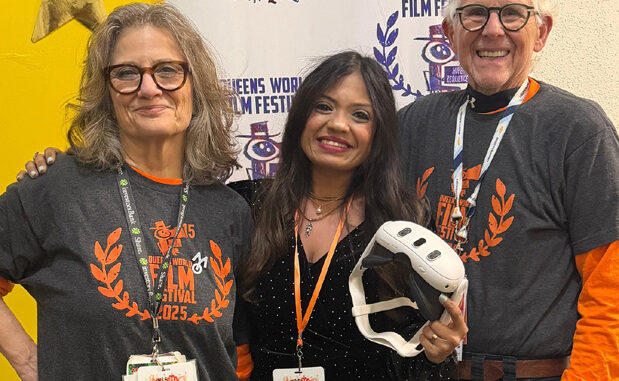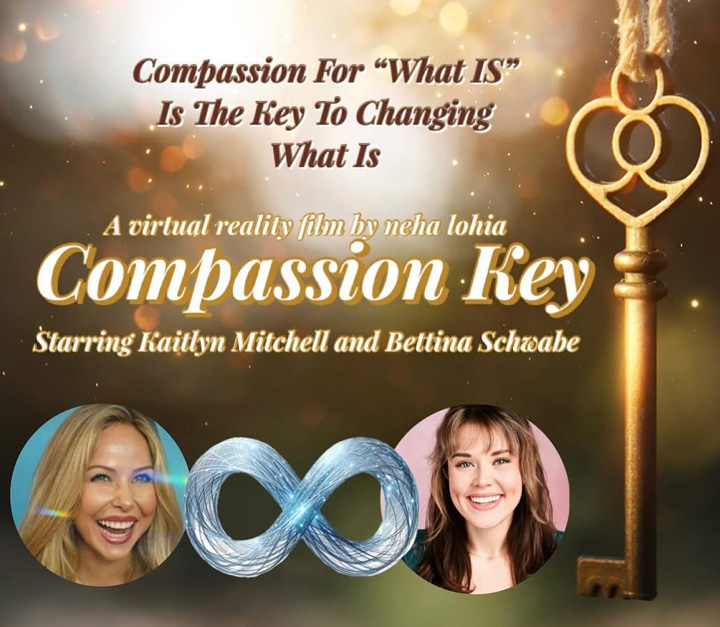
At the Dawn of Immersive Cinema, Indian Filmmaker Neha Lohia Steps Forward with her short films made inside Virtual Reality Environments and World: “I Am Here. I Am Ready. I Am a Bridge Between Experienced Old-School Cinematic Foundation and Emerging New-Age Meta-World Based Storytelling. Let’s Immerse and Ignite Change.”
New York, NY (TIP): In a sold-out screening at the historic and legendary Kaufman Astoria Studios’ Zukor Theater, filmmaker Neha Lohia premiered her VR-based short film HOME as part of the Queens World Film Festival 2025 to a raptorous sold-out crowd, marking a significant moment not only for her career but for the larger conversation about the evolution of cinema, consciousness, and immersive storytelling.
When three out of five Q&A questions from the audience centered around HOME, its process, and its emotional impact, Lohia stood on stage holding her VR headset and said:
“We shot this entire film inside 360-degree virtual worlds. The game arena has changed, but the rules remain the same you use the same solid film foundations, but now in the meta-world. The craft is the same with some added nuances of the new medium, and the canvas is now truly infinite.”
For an emerging VR filmmaker, standing in a venue touched by early giants Martin Scorsese, Francis Ford Coppola, Woody Allen felt like destiny folding into place.
“Showing my film at Kaufman Astoria was surreal,” Lohia said.
“This is where legends once stood and created their earliest works. To screen my first VR film here felt magical like the torch of storytelling was being passed across generations and technologies. I felt timelines blurring.”
Lohia, who has spent over two decades working in film and media across India and the United States, carries an unusually broad toolkit: traditional filmmaking, commercial storytelling, spiritual narratives, and now the cutting-edge languages of VR, XR, AI-assisted creation, spatial computing, and metaverse world-building. Her career includes roles at 20th Century Fox, Sony Pictures, Reliance Entertainment, and Alliance Media, contributing to major titles such as Avatar, The Ice Age series, My Name is Khan, and projects involving filmmakers like Karan Johar, Vishal Bhardwaj, and the Bachchan family.
Her recent academic pursuits at CUNY New York, where she is completing her film degree, are not merely a return to school they are a deliberate expansion into the next era of storytelling. Lohia is immersing herself in the new creative frontiers shaping global cinema: VR, XR, immersive direction, AI-driven narrative tools, virtual production, and emergent avatar and world-building technologies. These tools, she believes, are becoming central to how stories will be imagined, built, and experienced in the coming decade.
Her film HOME, originally developed in a VR storytelling course with Professor Jason Moore, represents this intersection of classical craft and future-forward technique. HOME has already charted an impressive path: winner of the Creative Achievement Award at the CUNY CSI Film Festival, an official selection at the prestigious Jagran Film Festival in India, and now a celebrated screening at Queens World Film Festival. For Lohia, presenting the film in the same building where some of American cinema’s most revered artists once worked felt “magical… like stepping into a continuum of storytelling.”
You still rely on emotion, composition, performance, rhythm, only now the canvas of creation is limitless.”
 Katha Cato, the festival’s Executive Director, noted the originality of Lohia’s approach: “Neha doesn’t use new technology as spectacle. She uses it as a vessel for emotional truth. Her work reminds us that courage and curiosity are the engines of great filmmaking.” Don Cato, Artistic Director of QWFF and one of Lohia’s former professors, added: “She brings classical cinema discipline into frontier landscapes most artists hesitate to enter. That balance of experience and exploration is rare, and it’s what pushes the medium forward.”
Katha Cato, the festival’s Executive Director, noted the originality of Lohia’s approach: “Neha doesn’t use new technology as spectacle. She uses it as a vessel for emotional truth. Her work reminds us that courage and curiosity are the engines of great filmmaking.” Don Cato, Artistic Director of QWFF and one of Lohia’s former professors, added: “She brings classical cinema discipline into frontier landscapes most artists hesitate to enter. That balance of experience and exploration is rare, and it’s what pushes the medium forward.”
During the discussion, Lohia spoke passionately about VR not only as a cinematic tool but as a transformative medium with applications far beyond entertainment. Drawing on her background in consciousness-based storytelling, she shared her belief that VR and XR can play powerful roles in healing, therapy, phobia reversal, meditation, medical training, grief work, and emotional resilience. “VR lets you experience something before you do it,” she said. “That makes it a tool for healing, for building confidence, for emotional rehearsal just the same way athletes visualize success before a race. Immersive media can reshape how we process pain, rebuild memories, and reimagine ourselves.”
Her insights echoed a sentiment once expressed by Carl Sagan: “Somewhere, something incredible is waiting to be known.” Lohia sees immersive media as one of those waiting discoveries.
She also explained how the film’s world was built. Instead of boarding flights for location scouting, she and her creative partners “world-hopped” inside VRChat, exploring dozens of virtual environments in minutes. “You can scout in 360 degrees, preview light, mood, and atmosphere, collaborate with creators across continents, and build custom worlds. This is location scouting without borders,” she said in an insight that drew enthusiastic nods from the audience.
Looking ahead, Lohia imagines a future where multiplexes host VR-enabled screens, much as 3D technology became mainstream during the release of Avatar, a transformation she witnessed firsthand while working with 20th Century Fox. She also envisions VR-native streaming platforms, tokenized creative economies, AI-enhanced world-building pipelines, and performance ecosystems tailored for XR actors and immersive storytellers.
 Her second immersive film, Compassion Key, completed recently, translates the emotional-healing method taught by Edward Mannix into a visual, immersive journey. “If meditation had a visual language, VR would be its alphabet,” she said. “This film allows viewers to feel what inner compassion work looks like internally.”
Her second immersive film, Compassion Key, completed recently, translates the emotional-healing method taught by Edward Mannix into a visual, immersive journey. “If meditation had a visual language, VR would be its alphabet,” she said. “This film allows viewers to feel what inner compassion work looks like internally.”
With her roots deep in traditional film and her vision stretching into the next century of cinematic evolution, Neha Lohia stands at a rare intersection linking the heritage of classical filmmaking with the possibilities of the emerging tech era. “I hope to collaborate with big tech, AI labs, creator communities, studios, and innovators,” she said. “We’re building not just films, but the future platforms where stories, healing, and technology that addresses the core human need of ‘connection’ will coexist.”
As she continues her studies and prepares new immersive works, one thing is clear: Lohia is not only adapting to the next age of storytelling. She is helping define it.
To learn more about Neha or for more information visit: www.nehalohia.com





Be the first to comment